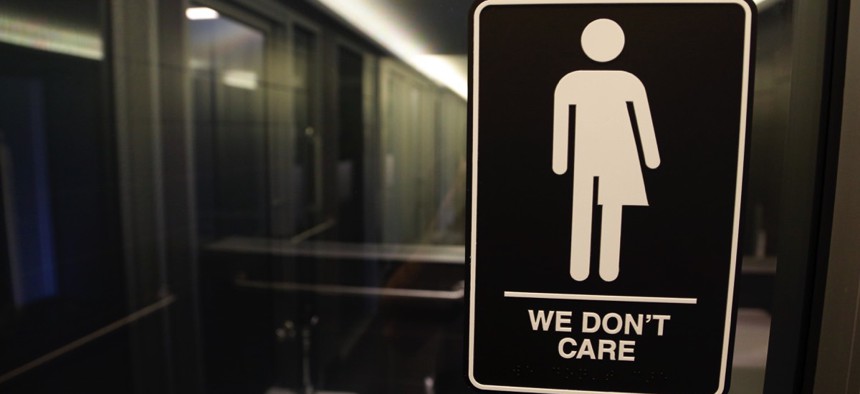How Will NCAA React to North Carolina’s ‘Humpty Dumpty’ H.B. 2 Repeal?

A restroom at 21c Museum Hotel in Durham, N.C. Gerry Broome / AP Photo
Also in our State and Local Daily Digest: Okla. proposal for new fees for electric and hybrid cars; New Orleans mayor fears federal disaster planning cuts; and N.M. governor vs. journalists.
STATE LEGISLATURES | Republican lawmakers who control the North Carolina General Assembly have passed a compromise measure to repeal the highly controversial H.B. 2 “bathroom” bill, while instituting a moratorium on local governments from passing ordinances on nondiscrimination protections. The measure is expected to be signed by Gov. Roy Cooper, a Democrat, who said the deal is not perfect but “begins to repair our reputation.” North Carolina has suffered economic blowback from companies reconsidering expansion plans in the state and organizations relocating conventions and events—including the NCAA, which moved some major tournaments and other sports activities out of the state. The compromise been described as a “Humpty Dumpty” measure, the goal being trying to “put things back the way they were and pretend the whole fight never happened,” which has angered progressives, civil rights advocates and critics of state preemption of local government authority. The big question in Raleigh: Will the compromise satisfy the NCAA, which is currently in the process of selecting championship sites for 2018-2022? [@NCCapitol / WRAL-TV; The Atlantic; The Charlotte Observer]
A $26.8 billion budget bill in Colorado would cut more than $500 million in payments to the state’s hospitals—raising the risk of closures for a handful of rural hospitals in the state. “I really cannot vote for a bill that is going to throw economic health in disarray in our rural communities,” said state Sen. Rhonda Fields, a Democrat. “I can’t do it. There’s got to be a better way to balance a budget.” [The Denver Post]
Rhode Island’s revenues are $27.3 million, 1.3 percent, behind budget projections through February—breaking a six year trend of government surpluses. Decreased funds jeopardize legislation proposing car tax cuts, free tuition and development incentives. [Providence Journal]
Proposed fees on electric and hybrid cars in Oklahoma would raise about $1 million in revenue every year, according to a state legislative analysis. [The Oklahoman]
CITY HALLS | New Orleans Mayor Mitch Landrieu is fearing proposed Trump administration budget cuts to the Urban Area Security Initiative, a disaster planning program that has provided nearly $50 million in funding to his city since 2003. The funding has allowed New Orleans to hire three municipal employees and the state to have an employee devoted to regional emergency management collaboration. It’s also funded training programs, chemical incident response teams, and communications software for first responders. [The Times-Picayune / NOLA.com]
The mayor of Draper, Utah, located south of Salt Lake City, rescinded plans for two homeless shelter locations in his city, after encountering intense blowback from residents. "You folks don't want it," Mayor Troy Walker said during a meeting that filled a 700-person-capacity auditorium, "so we can't in good conscience say we want it here." Residents threatened Walker’s impeachment over the plan for the shelters, which would’ve been part of a broader effort to relocate homeless people from downtown Salt Lake City. The crowd at the meeting booed a homeless man as he called for patience. [The Salt Lake Tribune]
TRANSPARENCY | The self-styled “most transparent administration” in New Mexico’s history just made the case in court that Gov. Susana Martinez isn’t obligated to speak with the “journalism racket.” Weekly newspaper the Santa Fe Reporter is suing Martinez’s administration for violating the state’s open records law in failing to release requested documents and regularly ignoring requests for comment—retaliation for critical coverage, according to the publication. [Santa Fe New Mexican]
NEXT STORY: FirstNet award finally issued





